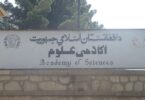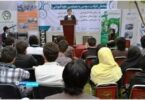The training courses on the principles of journalism and storytelling, which were held by the Afghanistan Think Room and the Dorr-e Dari Institute in the month of Hamal/Farvardin 1391 (March 2012), concluded yesterday (Friday 16 of Saratan/Teer 1391 = July 6, 2012).
These training courses, which were organized with the support of Bukhdi News Agency and the Equality Organization, lasted for three months, and more than 22 young people learned the principles of journalism and the basics of storytelling.
Murtaza Meraj, one of the instructors in the journalism section of this course, considers the organization of such training courses very beneficial for expanding media activities and strengthening the language and culture of the country.
Mr. Meraj, referring to the unprecedented quantitative and qualitative growth of Afghanistani media in the past decade, said that with the increase in media activities, it is natural that emerging media outlets require more manpower and professional employees. Most of our media, due to the employment of uneducated and inexperienced individuals in journalism, do not observe the rules and grammar of language, and if these problems are not addressed, they not only reduce people’s interest in domestic media and lead them to resort to international media, but also harm the language and culture of our society.
The development of mass media and the emergence of freedom of expression in the past decade are considered one of the achievements of the international community and the government of Afghanistan, and now hundreds of visual, auditory, and written media are active in the country.
Meraj, while praising the track record of most Afghanistani media in the past decade and their active role in spreading the culture and democratic values, points out some of the shortcomings and challenges that the media face, but many media owners have not noticed or taken seriously yet.
He considers the increasing negligence of media professionals and media practitioners in observing the Farsi language rules and the presence of spelling and grammatical mistakes in the media as one of the major shortcomings of the country’s media which he now sees as one of the media challenges.
He says, “Language forms the backbone of media, and the use of proper language plays a very important role in attracting and engaging readers, viewers, and listeners. One of the goals of organizing these training courses is to reduce language problems in the country’s media. Because most of our media, due to the employment of low-educated and inexperienced individuals in journalism, do not observe the rules and grammar of Farsi, and if these problems are not addressed, they not only reduce people’s interest in domestic media and lead them to resort to foreign media, but also harm the language and culture of society.”
In this training course, more than 20 young people learned the principles of journalism and the basics of storytelling.
From Meraj’s perspective, if this trend continues, the media not only be able to enrich the culture of society, which is one of the missions of the mass media, but it will also lead to cultural poverty, weakness of our language.
The role of social media in expanding media work
From Meraj’s point of view, with the emergence of social media like Facebook and Twitter and free access to weblogs, the media has come out of the monopoly of the government, political parties, and business people. Therefore, today, the media have become part of people’s lives.
According to him, this has led educated young people from all fields of study to acquire media skills and make optimal use of free media facilities.
According to this journalism instructor, a large number of the media students are the students of medical, engineering, and natural sciences who strive to become familiar with journalism knowledg and skills in order to be active and influential citizens in their society, rather than being “isolated and inactive followers”.
Language forms the backbone of media, and having good language plays a very important role in attracting and engaging readers, viewers, and listeners.
Meraj criticizes the way journalism is taught in the public universities, saying that many university courses in the field of journalism have not been updated, and now they teach subjects whose efficacy has been lost after the digitalization of media, and now new issues and topics have emerged.
Written by Elias Abdali – Bukhdi News Agency
Kabul, July 7, 2012







Leave a Comment